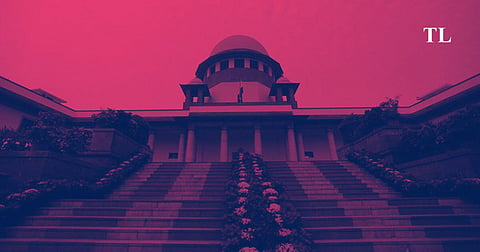

THE Supreme Court on Monday issued notice to former Kerala police officers S.Vijayan and T.S. Durgadutt, former Gujarat Director General of Police (DGP) R.B. Sreekumar, and former Intelligence Bureau official S. Jayaprakash on an appeal filed by the Central Bureau of Investigation (CBI) against the Kerala High Court's order granting them anticipatory bail in a case registered by the agency in connection with the Indian Space Research Organisation (ISRO) scientist espionage case.
A two-judge bench of Justices A.M. Khanwilkar and C.T. Ravikumar, after hearing Additional Solicitor General (ASG) S.V. Raju, decided to send notices to the four accused and directed the listing of the matter for further hearing on November 29.
Sreekumar, who is accused no.7 in the CBI's First Information Report (FIR) in the case, is known for taking a stand against the then Narendra Modi-led government in the state for its alleged role in the 2002 riots. He was denied promotion in 2005 after his deposition against the state government. He had accused the government of preventing the police from controlling riotous mobs during the 2002 carnage against Muslims in the state.
Also read: "Sycophantic Servility of Judicial Commission": Former Gujarat DGP R.B. Sreekumar on 2002 Godhra riots probe panel report
In 1994, Sreekumar was a Deputy Director, Subsidiary Intelligence Bureau (SIB) at Thiruvananthapuram, when the former scientist, Nambi Narayanan was framed in the ISRO espionage scandal. At the time of his arrest on November 30, 1994, Narayanan was working on cryogenic engine technology at ISRO. The police investigators had accused him of passing on documents and drawings of ISRO relating to the technology to Pakistan. But the Supreme Court had given a clean chit to Naryanan in 2018 after he fought on to prove his innocence.
Before the Kerala High Court, the CBI had argued that even though the offences alleged against Sreekumar and others might not be so grave, there was a clear indication that they were part of a team, which had ulterior motives to torpedo the attempts of ISRO for manufacturing the cryogenic engine in India. For that purpose, Raju had argued that interrogation of the officers was very essential.
On the contrary, Sreekumar had been saying that he had not interrogated Narayanan. Nor was there any allegation by him that Sreekumar had harassed him. He added that he was tasked with the job of interrogating another former ISRO scientist, D. Sasikumaran.
While granting bail to the four accused, including Sreekumar, the High Court had observed: "There is not even a scintilla of evidence regarding the petitioners being influenced by any foreign power so as to induce them to hatch a conspiracy to falsely implicate the scientists of the ISRO with the intention to stall the activities of the ISRO with regard to the development of Cryogenic Engine".
"Unless there are specific materials regarding their involvement, prima facie, it cannot be said that they were acting against the interest of the Country", the High Court's Justice Ashok Menon had observed. He found the allegations that the accused worked at the behest of a foreign power "rhetoric".
ASG Raju on Monday contended before the top court that the grant of pre-arrest bail to the accused persons would frustrate the investigation.
Earlier this year, the CBI registered an FIR against 18 persons, including the four, in the matter of alleged framing of space scientist Narayanan in the 1994 ISRO espionage case.
The FIR was registered under Sections 120B (Punishment of criminal conspiracy), 167 (Public servant framing an incorrect document with intent to cause injury), 218 (Public servant framing incorrect record or writing with intent to save person from punishment or property from forfeiture), 330 (Voluntarily causing hurt to extort confession, or to compel restoration of property), 323 (Punishment for voluntarily causing hurt), 195 (Threatening any person to give false evidence), 348 (Wrongful confinement to extort confession, or compel restoration of property), 365 (Kidnapping or abducting with intent secretly and wrongfully to confine person), 477A (Falsification of accounts) and 506 (Punishment for criminal intimidation) of the Indian Penal Code.
The top court in 2018 held that the case launched by the Kerala police against Narayanan in the mid-1990s in the ISRO espionage case was malicious and had caused tremendous harassment to him. While awarding a compensation of Rs. 50 lakh to him, the court also formed a committee headed by Justice D.K. Jain to find out ways and means to take appropriate steps against the erring officials. It was held that Narayanan, a successful scientist with a national reputation, had been compelled to undergo immense humiliation.
On April 15 this year, the apex court perused the report submitted by Justice Jain which apparently indicted the concerned police officials. The union government had moved an application in the Court to accept the said report.
The apex court had then directed to supply the report to the CBI, which was asked to proceed in the matter in accordance with the law. The Court also held that it was open for the CBI to treat the report as a preliminary inquiry report and proceed in the matter appropriately. It had added that the CBI could use the report during further enquiry/investigation.
The Court had also clarified that the accused would be free to pursue all the pleas, as may be available to them in the proceedings that may follow, if and when initiated by the CBI.
After the April 15 order of the apex court, the CBI went ahead and lodged an FIR in the matter against the 18 accused persons.